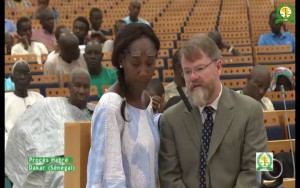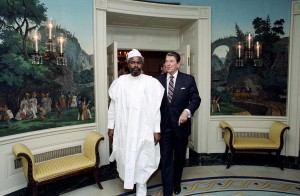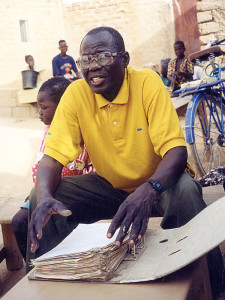HRDAG Testifies in Hissène Habré Trial
Last week HRDAG’s executive director, Patrick Ball, served as an expert witness for the prosecution in the trial of Hissène Habré, the ruler of Chad from 1982 to 1990. The trial is taking place in Dakar, Senegal, where the 73-year-old Habré has been living since 1990 when he fled Chad. He has already been sentenced to death in absentia in Chad.
Habré is being charged with war crimes, crimes against humanity, and torture that took place during his eight-year reign. The trial is happening at the Extraordinary African Chambers, which was inaugurated by Senegal and the African Union to try Habré. This is the first time that one country has prosecuted the former ruler of another country for war crimes.
For five hours, Patrick testified (in English, translated to French) about the data analysis done by HRDAG to determine the mortality rate in Habré’s prisons. HRDAG’s analysis showed that the death rate for political prisoners was much higher than for adult men in Chad: 90 to 540 times higher. On its worst day in the time period for which data were analyzed, the mortality rate was 2.37 deaths per 100 prisoners. During a nine-month period in 1986-1987, the mortality rate in Habré’s prisons was higher than that of US POWs in Japanese custody during World War II.
Statistical expert Ball tells court that worst day had 2.37 deaths for 100 prisoners in #hissenehabre jails.@hrdag pic.twitter.com/58ta1w5AgA — Reed Brody (@ReedBrody) September 18, 2015
One of the three judges hearing the trial asked Patrick if there was a political motive for the high mortality; Patrick declined to answer this question. The human rights statistician’s role is to put forth analysis, he said, not to draw political or ideological conclusions. “This is the kind of input we at HRDAG want to provide for courts, academic analyses, and other human rights partners: very specific, scientifically serious, and free of political and legal judgments,” he said. “The defense said repeatedly that they would not question the work we did in this report.”
The defense tried to discredit HRDAG’s analysis by accusing the prosecution of a neocolonialist plot to bring down a strong African leader.
Patrick is one of ten expert witnesses; in addition, there are 60 eyewitnesses testifying for the prosecution. Regarding how his testimony was received, Patrick said, “We will need to wait for the judges’ ruling to learn what they think. Meanwhile, I hope the victims are satisfied that the statistics reflect their experience.”
Souleymane Guengueng, a torture victim under Habré, said this: “Patrick’s statement showed that we were right to carry on this struggle for justice. By comparing the death rate in Habré’s prisons with that of American prisoners in Japanese jails during World War II, he enabled the public to grasp the seriousness and the horror of what we experienced.”
While there has been plenty of French-language coverage of the trial, there has been very little coverage in English. We at HRDAG, along with thousands of others, eagerly await the verdict.
From all over #Chad, from any religion, torture survivors, widows & orphans united for justice. What an example! pic.twitter.com/5l3qb1pQhD
— Henri Thulliez (@HenriThulliez) January 23, 2015



